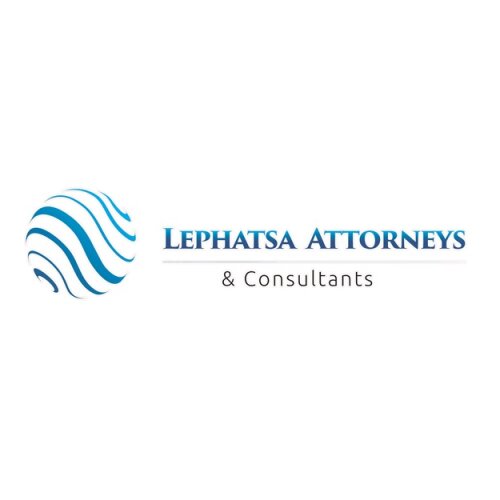Best Debt & Collection Lawyers in Lesotho
Share your needs with us, get contacted by law firms.
Free. Takes 2 min.
Or refine your search by selecting a city:
List of the best lawyers in Lesotho
About Debt & Collection Law in Lesotho
Debt and collection law in Lesotho is a critical area of legal practice that revolves around the management of debts and the processes through which creditors can collect outstanding amounts from debtors. The legal framework in Lesotho is designed to provide balance and fairness between creditors and debtors, ensuring that the collection of debts is done lawfully and ethically. The Commercial Court in Lesotho often handles cases related to debt, while the legal provisions ensure compliance with national statutory requirements and international best practices.
Why You May Need a Lawyer
There are several scenarios where legal assistance might be beneficial in the area of debt and collection:
- If you are a creditor seeking to recover outstanding debts and need help navigating the legal process to enforce payment.
- When experiencing harassment or unfair practices by debt collectors and require protection under the law.
- If you are a debtor unable to fulfill financial obligations due to unforeseen circumstances and need legal help to negotiate or restructure your debt.
- When involved in disputes about the amount or validity of the debt claimed by creditors.
- If you need assistance understanding your rights and obligations under the current debt collection laws.
Local Laws Overview
Debt collection laws in Lesotho are primarily governed by the Debtors Act of 1938 and the common law principles. Key aspects include:
- Rights and Obligations: Both debtors and creditors have specific rights and obligations laid down under the law.
- Notice Requirements: Creditors must provide clear, written notice to debtors regarding the debt and any impending legal action.
- Limitations: There are statutes of limitations that restrict the time frame within which a creditor can pursue debt recovery through legal proceedings.
- Harassment Laws: Regulations prohibit unfair or aggressive debt collection practices to protect debtors from harassment.
Frequently Asked Questions
What are the legal ways to collect a debt in Lesotho?
Creditors can issue demand letters, engage collection agencies, or initiate court proceedings to recover debts, following prescribed legal protocols.
How can a debtor protect themselves from unfair collection practices?
Debtors can familiarize themselves with their rights under the debt collection laws and seek legal assistance if they believe a collector is violating these rights.
What happens if a debtor defaults on a court-ordered debt repayment?
The creditor can seek a garnishee order against wages or bank accounts or take further enforcement actions as allowed by law.
Is there a limitation period for collecting debts in Lesotho?
Yes, typically six years for most contracts, but it is advisable to verify with legal counsel for specific cases.
Can a creditor seize a debtor's property in Lesotho?
Property seizure is a legal option, but it must follow a court judgment and legal enforcement procedures.
What steps can be taken if a debtor disputes the debt?
The debtor should formally communicate with the creditor, providing evidence to support the dispute, and may seek mediation or legal adjudication.
How are interest rates on unpaid debts regulated?
Interest rates are governed by contract terms and statutory limits to prevent usurious charges.
Can debtors negotiate debt repayment terms?
Yes, debtors can attempt to negotiate terms, and creditors may agree to restructure payment schedules.
What is the role of a collection agency?
Collection agencies work on behalf of creditors to recover outstanding debts, typically after original collection attempts have failed.
How can bankruptcy affect debt collection efforts?
Bankruptcy may discharge certain debts, but it requires a legal process where a debtor's financial status is formally assessed.
Additional Resources
For more information and support, consider reaching out to:
- The Commercial Court of Lesotho for legal procedures and rulings.
- Legal Aid Lesotho for assistance in obtaining affordable legal advice.
- The Central Bank of Lesotho for guidance on financial regulations affecting debt collection and interest rates.
- Consumer Protection Associations for support and advocacy against unfair debt collection practices.
Next Steps
If you require legal assistance in debt and collection matters:
- Identify and document all relevant information and communication related to the debt.
- Consider consulting with a lawyer specializing in debt and collection law for an evaluation of your case.
- Reach out to a legal aid organization or a professional legal firm in Lesotho.
- Prepare to engage in negotiations or legal actions as advised by your legal counsel.
Lawzana helps you find the best lawyers and law firms in Lesotho through a curated and pre-screened list of qualified legal professionals. Our platform offers rankings and detailed profiles of attorneys and law firms, allowing you to compare based on practice areas, including Debt & Collection, experience, and client feedback.
Each profile includes a description of the firm's areas of practice, client reviews, team members and partners, year of establishment, spoken languages, office locations, contact information, social media presence, and any published articles or resources. Most firms on our platform speak English and are experienced in both local and international legal matters.
Get a quote from top-rated law firms in Lesotho — quickly, securely, and without unnecessary hassle.
Disclaimer:
The information provided on this page is for general informational purposes only and does not constitute legal advice. While we strive to ensure the accuracy and relevance of the content, legal information may change over time, and interpretations of the law can vary. You should always consult with a qualified legal professional for advice specific to your situation.
We disclaim all liability for actions taken or not taken based on the content of this page. If you believe any information is incorrect or outdated, please contact us, and we will review and update it where appropriate.
Browse debt & collection law firms by city in Lesotho
Refine your search by selecting a city.










